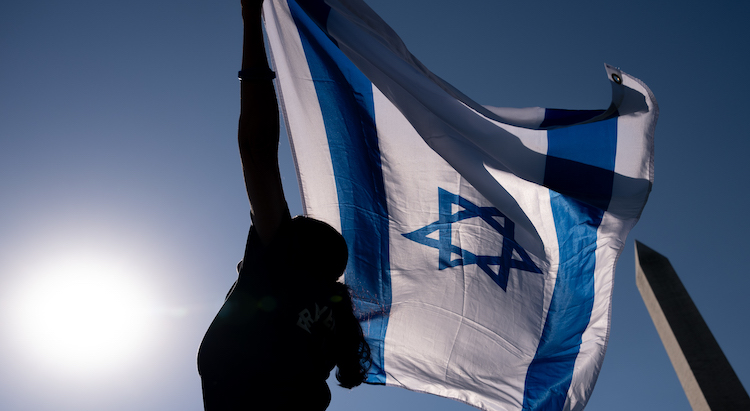Imagine reading the following headline: “Man shoved onto subway tracks survives, but at what cost?”
This is how the media handles the story every time Israel outwits its enemies and lives to fight another day.
The latest version comes from Michael Shear in the New York Times, though it is entirely representative of the general theme of postwar reporting on Israel, to say nothing of the social-media “influencers” forced to find some way to cope with another successful Israeli defense of its sovereignty.
The Times headline is: “The Cost of Victory: Israel Overpowered Its Foes, but Deepened Its Isolation.”
Translation: The losing side is resentful of the victors.
The headline’s claim doesn’t even hold up. Israel had the use of Syrian airspace for its attacks on Iran, and Jerusalem and Damascus are in negotiations over burying the hatchet completely. Flying over the Arab world to take out Iran’s air defenses is a sign not of isolation but of integration.
That quibble aside, there is a larger problem with this conceit. Take this paragraph from Shear’s piece:
“Mr. Netanyahu’s relentless and unapologetic military response to the Oct. 7, 2023, Hamas-led attack that killed 1,200 people and took 250 people hostage has cemented the view of Israel as a pariah, its leadership accused of genocide and war crimes, and disdained by some world leaders. In opinion polls globally, most people have a negative view of Israel.”
The first thing to note about that paragraph is that this characterization of Israel’s standing was the same as it was before the war, even though the Times portrays it as a result of the war.
A quick search, for example, shows the Times warning of Israel’s “pariah” status—using that exact word—for nearly 20 years.
Israel’s leadership “accused of genocide and war crimes”? Welcome to the party, pal. Was this article written in 1982 or 2025? The answer is: yes. Most of Israel’s bad press is made of 100 percent recycled material.
Israel’s government is “disdained by some world leaders”? As if that’s a new development. The president of France disdaining the Jewish state is what we call “the status quo.”
I will go one step further: All those things were said after Oct. 7, 2023 and before Israel went into Gaza. This point is crucial, because the genocide accusations were leveled after Hamas carried out an explicitly genocidal attack on the Jewish state. Israel is punished for weakness and punished for strength. So it might as well choose the latter, right?
Support for Israel, the Times warns, “has become a fiercely contentious issue in Congress, the subject of angry debates and protests on college campuses and fuel for a surge in antisemitic incidents in the United States and around the world.”
So what I’m reading here is that when an Egyptian man in Colorado burned alive an 82-year-old Jewish woman, it’s on Israel’s head—not the man who murdered her, not the mouth-foaming activists and politicians yelling “globalize the intifada” and other slogans encouraging people to burn Jews alive, and not the city, state or country that didn’t protect her.
Another way of saying this: How dare the Jews survive! Our survival only causes the world to keep trying to kill us!
And again, those masses gathering on college campuses around the country (and the Western world) waving Hamas and Hezbollah flags? They were mobilizing the moment—and I mean the moment, the very second—the Hamas attacks were carried and while the attacks were still ongoing and therefore long before Israel had formulated a response of any kind.
Then we’re told that Israel’s “violence has strained the good will of the country’s allies and neighbors.” Reminder that before Oct. 7, 2023, Israel’s neighbors included Hezbollah and Bashar al-Assad’s Syria. I’d love to see the author’s personal list of acts of goodwill performed by Hezbollah and Assad.
After that, the article goes back to blaming Jews for attacks on them, telling us that “many Israelis now feel threatened while abroad, even as they are more secure at home.”
Well if they just feel threatened I suppose it’s not much to worry about. But perhaps it is, in the words of the band Boston, more than a feeling? Perhaps it is, say, a pogrom in Amsterdam, the city where Anne Frank hid in an attic?
At this point we’re about a quarter of the way through the Times article. The rest is just these nonsense points repeated ad nauseum.
All of this is because Israel fought a defensive war. Well actually, it’s because Israel won a defensive war. And its enemies and critics are struggling to cope.


















